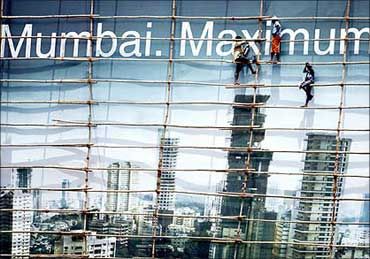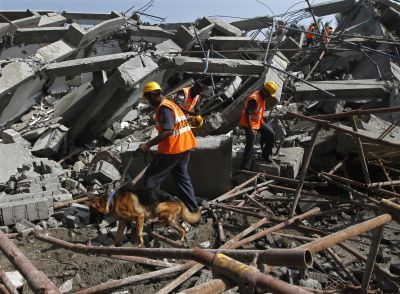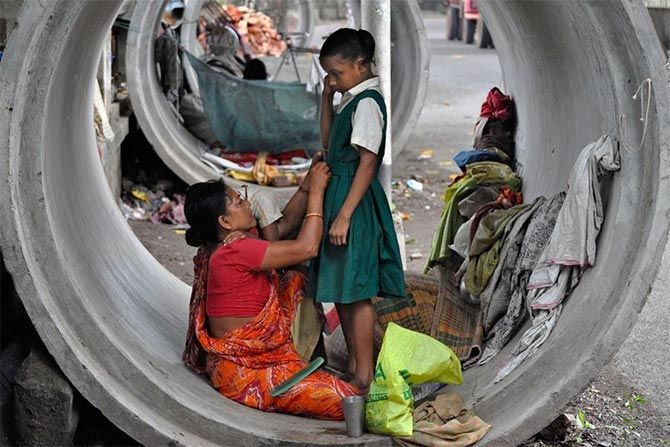 'Disparity is not only in Mumbai; you see it in every city. The other day, I saw right next to the mansion of Mukesh Ambani worth Rs 5,000 crore for one family, thousands of people sleeping on the pavement. This is the urban India you have created!'
'Disparity is not only in Mumbai; you see it in every city. The other day, I saw right next to the mansion of Mukesh Ambani worth Rs 5,000 crore for one family, thousands of people sleeping on the pavement. This is the urban India you have created!'
After serving the Indian Army, M G Devasahayam joined the Indian Administrative Service, and worked in several important areas like urban planning, energy sector, utility management (public transport, electricity), accountability and governance in public services.
After retiring from the IAS, he worked with the corporate sector in various capacities, and then founded the Citizens' Alliance for Sustainable Living and is its managing trustee.
With the Narendra Modi government earmarking Rs 7,060 crore (Rs 70.60 billion) for the development of smart cities, Shobha Warrier/Rediff.com spoke to the former town planner who was instrumental in developing Chandigarh.
How do you look at the finance minister allocating Rs 7,060 crore for developing smart cities in various parts of India? Do you think this is a step in the right direction?
I have been instrumental in developing Chandigarh 25 years after it was conceptualised and developed, but people like us are not consulted today as we do not import American methodologies and make money out of it; we speak the truth.
When I became an administrator there in Chandigarh, I found that humongous mistakes were committed in an essentially rural space. We found that it was developed as an exclusive city for the wealthy. There was no plot less than half an acre! We had to have a lot of corrections to make it a more inclusive city.
What exactly do you mean by an inclusive city?
First, we made each plot smaller in size to 200 square yards. Most important, I brought the informal sector into the city. It is the informal sector that gives employment to 80 percent of the people. They were kept away from the urban space allowing only the formal sector that has the money, in.
Then, because of the Aravalli range, we did not allow any high rise buildings.
Was it to stop the slums from coming up that the informal sector was not included in the urban space?
But there were so many slums in and around Chandigarh city when I went there and they were called labour colonies. We worked overtime to create slum clearance and rehabilitation, which was not just throwing them out, but completely integrating them, based on their livelihood.
Urbanisation is not just brick and mortar, particularly in a country like India. It has to be inclusive and address the lowest of the lower.
Are you not happy with developing smart cities?
My question is, have you developed even one city after Chandigarh? What the Government of India is talking about now is independent towns and not satellite towns like developing a place like Kancheepuram near Chennai. But according to me, conceptually it is wrong.
You just cannot build cities by building roads and buildings. You should understand that people with flesh and blood live there.
What is your governance system, philosophy and urban politics for these smart cities? As we have not developed an urban philosophy and urban politics, governance of cities has become horrendous. There is not a single political leader in India who understands urbanisation.
What kind of knowledge should they have on urbanisation?
The 74th Amendment gives complete autonomy to urban bodies like corporations, municipalities, etc; that is, they should be able to manage on their own. They shouldn't be a subsidiary to the state government.
Look at, for example, London or any city in Europe or the US, the governance of cities is done by urban bodies and not by the state government. But here, we have the municipality only for namesake; they have absolutely no authority. What is the role of a mayor here?
Do you think developing smart cities on the lines of the cities we have right now, will have a negative impact?
Totally negative impact. Cities and towns must organically grow with the livelihood facilities provided by the local government with support from state and central government. Secondly, cities must have an independent governance system.
Will it help if they develop these smart cities like Chandigarh?
First of all, they must understand how Chandigarh developed. You can learn from it as there is a learning curve there, but nobody is interested. There should be a fundamental philosophy behind developing cities, like it has to be ecologically and environmentally sustainable.
 Look at the tragedy that happened in Chennai recently. They should not have allowed buildings to be constructed in that area. The decision-making of all the governments is absolutely lopsided, governed only by monetary considerations.
Look at the tragedy that happened in Chennai recently. They should not have allowed buildings to be constructed in that area. The decision-making of all the governments is absolutely lopsided, governed only by monetary considerations.
Image: Rescuers try to locate survivors in the rubble of a collapsed building in Chennai, July 2014.
Now that the central government has allocated funds for smart cities, what would you tell them?
The concept of smart cities is wrong. It is an American concept. The word smart city itself is repulsive. For whom are you building the cities? We have a wrong notion that cities are for the moneyed class. Real estate is a black money business and they have converted urbanisation into real estate.
First, this government should come out with an urban philosophy. Urbanism is collective community living and not gated cities and high-rise buildings. The best example of urbanism in India is Dharavi in Mumbai. It is a self-contained urban area. It might have given rise to criminals, but do we not have much bigger criminals outside Dharavi? But it is a very good model to follow. But what do they want to do? Throw these people out and build high-rise buildings.
Second, these cities have to be low rise, low intensity community living. Plan the city accordingly. Most of our villages and towns developed on community lines only.
Even Chennai was developed in certain areas on community lines, but when the concept of a city arose, they disturbed the communities. You provide workspace to communities and let them develop from there. Basically, these cities should be built for India with the living and the livelihood combined.
Without an economic base, you can't build cities. They can look for an area where there is already an income generation opportunity before locating the area for the so-called smart city.
Another important thing is we should have urban politics. Urban politics is different from rural politics though most of them have come from rural areas. You can’t have the rural zamindari politics in urban areas; you need participatory, consultative, inclusive and democratic politics.
The 74th Amendment was enacted in 1993 and even after 20 years, have we developed an urban philosophy or politics?
Who is responsible for this?
All are. We have a corrupt system. And the fault lies in the Constitution itself. We have a terribly flawed Constitution. It doesn't talk about decentralised democracy. That was what Mahatma Gandhi wanted. Though we had panchayats, the Constitution talks only about Parliament and the legislature. That was why there was a lot of uneasiness.
In 1988, Rajiv Gandhi made the foolish statement that we have to give power to the people! In a democracy, who gives power to whom? People say Manmohan Singh was an accidental prime minister, but the actual 'accidental prime minister' was Rajiv Gandhi who had no qualifications to be one. Then it was (P V) Narasimha Rao who came out with the 74th Amendment, but till today, it is not implemented. It was to convert urban local bodies into urban governments.
By 2050, 50 per cent of India will live in urban areas. Tamil Nadu has already reached the figure. 48 per cent of Maharashtra lives in urban areas now, and states like, Gujarat, Karnataka, Punjab, have crossed 40 per cent, and almost all states except a few have crossed 30 per cent. So, you need to have a major governance revolution.
Do you feel if the government did not come up with an urban policy, a disaster is bound to happen soon?
It has already happened. Urbanisation today is a disaster. Take Chennai, for example. Where do you have water for the city? The entire water needed for the city is manufactured. It is because of zero planning. Only money plans the city! Where is the green cover?
Is migration from the rural areas, the major problem urban areas face?
This has been happening from the very beginning. It goes back to the time Jawaharlal Nehru was imposed on the country by Mahatma Gandhi. When you are evolving a development model for a country, you need a good model, capital and technology to make the model work, and a market for the products.
After Independence, we had all the three to develop an agro-based economy, but Nehru imposed an artificial large industrial economy and brought in the rotten, inefficient Russian model. He then made it into a mixed economy. So we have no philosophy and got knocked out.
Over the years, agriculture came under tremendous pressure and it resulted in migration from rural areas. In the last 20 years, the situation has deteriorated. Remember P Chidambaram made the foolish statement that we could not have 70 per cent of the people living off agriculture, and he wanted India to be like the US. You should understand that every country has its own characteristics.
That is why our founding fathers wanted a balanced economy for India where everyone will have a say.
You said recently that what we have is globalisation driven urbanisation... You mean, they follow what is being followed in other countries?
They are not even doing that. In the Western countries, urban development takes place with a basic norm and they adhere to those norms. Here, the concept of globalisation is adopted without conforming to any norm. Even where there are rules and regulations, they are not being followed.
It is another matter that you can't have the same urban concept here; it has to be different from what America or any other country follows.
I will give you an example about Chandigarh. Punjabis love eating outside, but I found that they had not provided any informal space for that. With the result, wherever there was space, dhabas sprung up. I had to work overtime to carve out an informal space and put all of them there.
Also, when I went there, I found that there were no cheap houses for the people who came to build the city, and slums started coming up.
Which, according to you, is the best city that follows sustainable urban development?
The best I can think of is Hamburg. It is a fantastic model. Most of the European cities manage their cities well. Now, America and South Africa also have good models.
 If you take a city like Mumbai, you see the divide between the rich and the poor widening. What will this lead to?
If you take a city like Mumbai, you see the divide between the rich and the poor widening. What will this lead to?
Disparity is not only in Mumbai; you see it in every city. The other day, I saw right next to the mansion of Mukesh Ambani worth Rs 5,000 crore for one family, thousands of people sleeping on the pavement. This is the urban India you have created!











 © 2025
© 2025